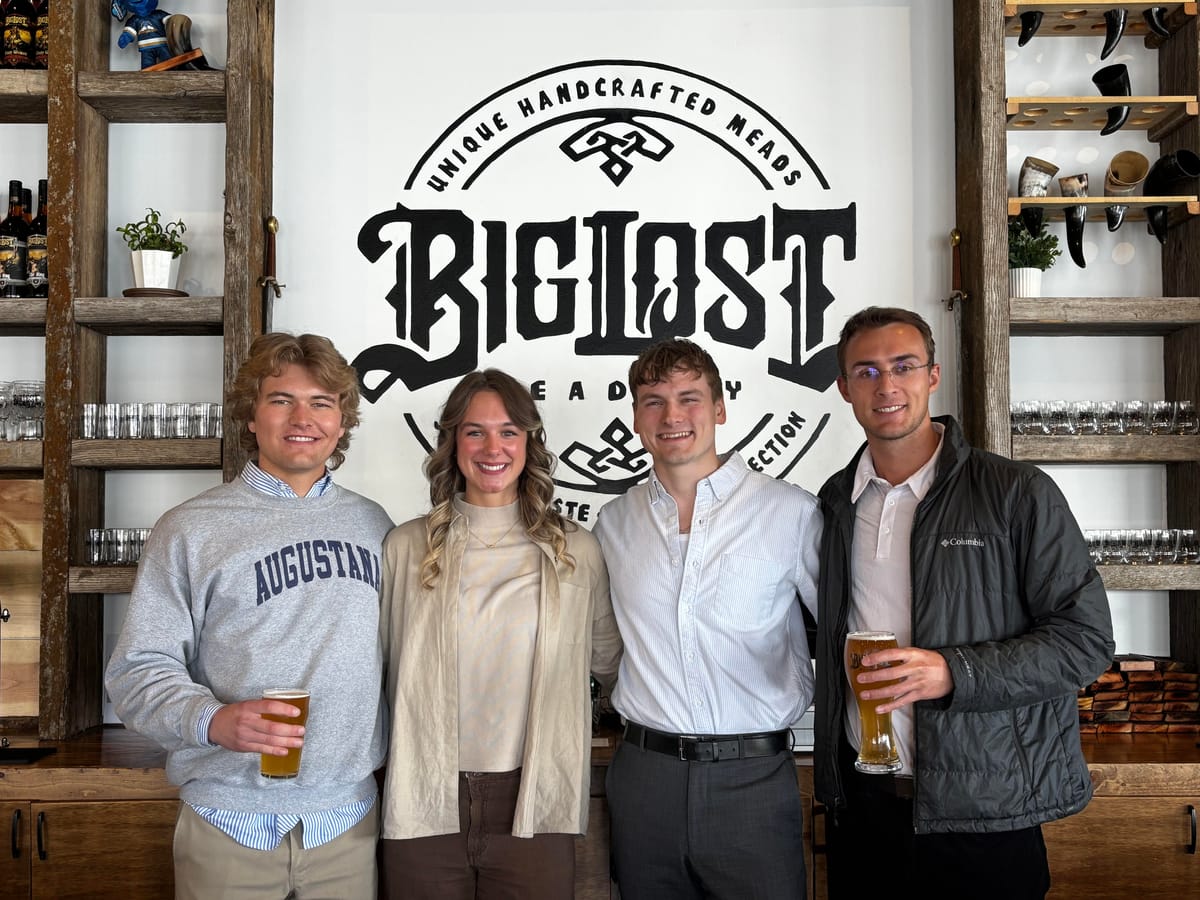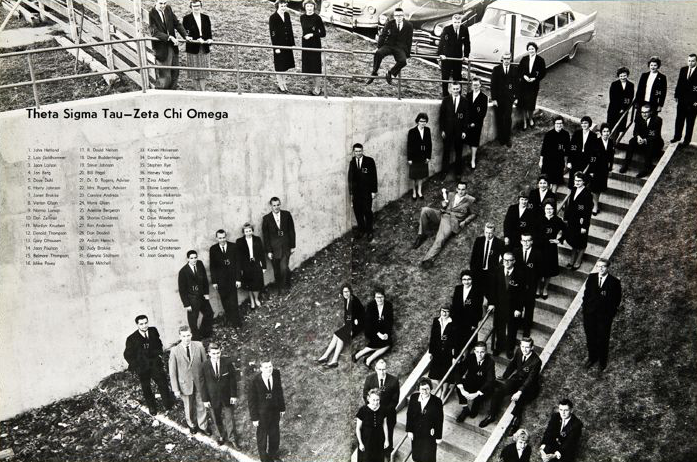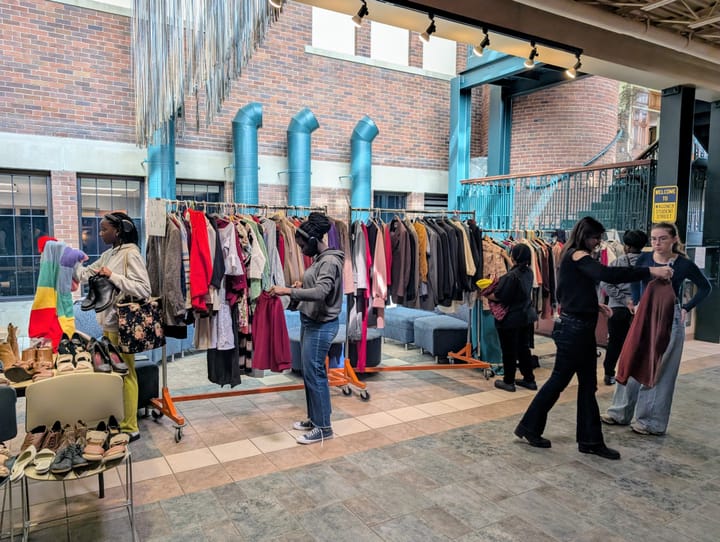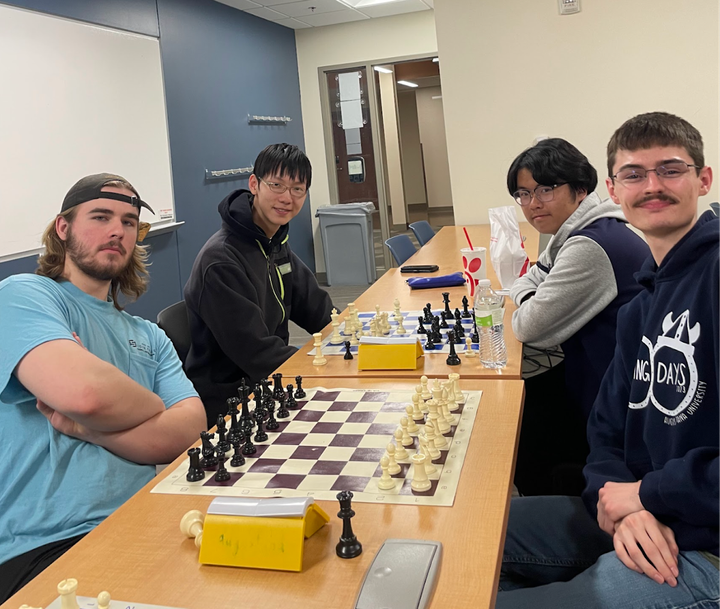Brewing, fermentation cohort brews 'Orange Honey Saison'

Anticipation is building for Augustana’s brewing and fermentation students. After years of intense work and dedication from campus and Sioux Falls community members, a single project could be the make or break: fifteen weeks, four students and one artisan beer they call “Orange Honey Saison.”
Augustana’s first graduating class of brewing and fermentation minors are in the midst of the program’s first-ever capstone — a culminating course that challenges the brewing and fermentation students to use the skills they’ve accrued through the program by creating and executing a project, thereby demonstrating their expertise.
Chris Oostra, Grant Pederson and Steven Asmus are all senior brewing and fermentation minors collaborating on their capstone, and they are joined by junior brewing and fermentation minor Gracen Juffer. The four-person cohort made it their mission to design, make and sell a beer, partnering with newly established Sioux Falls meadery Big Lost Meadery & Brewery.
They discovered, amid their capstone, that their project was more than just a project: It was a lesson in staying true to their values, designing beer like artists and understanding the stakes of a business partnership.
Biology major Juffer began working at Big Lost this spring where she got in contact with Sam Clikeman, owner of Big Lost based in Gillette, Wyoming. When Juffer and Clikeman discussed Augustana’s brewing and fermentation minor, Clikeman expressed interest in helping Juffer and her classmates through the process of creating a beer, brewing it and selling it. In exchange, the beer would be sold in-store at the Big Lost Meadery Sioux Falls location.
Assistant professor of biology and brewing and fermentation program coordinator Stephanie Bruggeman said Clikeman worked closely with the cohort. At their first meeting near the end of J-term, Clikeman asked Oostra, Juffer, Pederson and Asmus to create goals, identify the beer they wanted to make and build a business plan.
“He told us that we needed to come up with more concrete objectives,” Juffer said. “He also said we need to start considering finances, things like that, where we're gonna source our ingredients from. But ultimately, by that point we had a story, and we knew what we wanted to do.”
After Clikeman challenged the team to develop clearer goals and make more consistent business plans, they realized how much work, time and energy the industry requires. None of them backed down despite knowing the difficulty and pressure they’d face throughout the project.
In the end, the cohort identified two main goals. Their first goal was to get the name of the minor, the brewing and fermentation club — Brew and Gold — and the beer out into the community. The second goal was to create an annual partnership with Big Lost for future cohorts of brewing and fermentation capstone students.
The second goal came on more slowly, Juffer and communication leadership major Pederson said. They didn’t realize that Clikeman had been pushing them all along — asking the question, “what can you do for me?” In a business relationship, each partner has something the other wants, Bruggeman said.
“Sam was really good at gently guiding them to try and figure out what the relationship is worth to him, you know?” Bruggeman said. “It’s not just him doing things for them: It’s also doing things for him. He worked really hard to get them to see that and see that they brought value they could use as a bargaining chip.”
After meeting with Bruggeman and Clikeman on multiple occasions, Oostra, Juffer, Pederson and Asmus began deciding on a beer to brew. They tasted eight different kinds of beers, all of which they disliked, Bruggeman said.
For his environmental studies independent study, environmental studies major Oostra created a beer made from the sustainable grain crop Kernza — a perennial grain alternative to wheat that requires fewer tills and is more efficient with its nitrogen uptake and use. Nitrate leaching from inefficient nitrogen uptake can damage drinking water, and tilling soils can lead to damage and a rapid loss of soil nutrients. It was important to Oostra that the beer they make be sustainable, so after they all tried and enjoyed his beer, they decided on a kernza saison, with earthy, fruity and spicy flavors.
In addition to sustainable grains, the beer used locally sourced honey from Brandon, South Dakota, beekeeper Duane Duerr. The one drawback to using sustainable resources is the price of the product. Pederson said that, because the resources they used were expensive to acquire, the beer itself will be considered a sustainable, artisan beer.
“[Oostra] really made a fantastic beer, and that’s what [Big Lost] said too,” business and marketing major Asmus said.
The cohort has largely worked together for this project, but Oostra and Juffer worked primarily on the product and Pederson and Asmus worked on the business and marketing side.
The brewing and fermentation minor has two separate tracks: applied brewing and brewing management. In the capstone, applied brewing students and brewing management students work together to create and sell the product.
A student on the applied brewing track, Oostra has worked closely with the preparation of the beer. Picking and choosing ingredients, he said, feels like making art, and that’s been his favorite part of the project so far.
“It’s like making a painting, you know?” Oostra said. “You have all of these different aspects that you wanna add-in, and there's so many different ways to get there. It's really just like an artwork: things as small as two degrees in temperature, how much of specific [ingredients] you use, what you want it to be able to look like in terms of color and just tiny little flavors like the yeast that you use and how it affects [the flavor profiles.]”
All four bring something different to the project, Bruggeman said, and they balance each other out. Oostra is an advocate for sustainability, Juffer brings her natural leadership skills, Pederson helps the group stay calm when things get tough or go wrong, and Asmus is dedicated to the brewing program and Brew and Gold club like no other.
“It's all meshed so well that we've all just really carried the weight evenly, I'd say: bringing different strengths and perspectives to the tables of the applied side or the business side,” Juffer said.
After kegging their beer, the team will host a launch event for “Orange Honey Saison” at Big Lost Meadery on Friday, March 28 at 7 p.m. The beer will be available there through the end of the school year.
“I really enjoyed the marketing promotion part of the launch party, and the graphics were really fun,” Pederson said. “I don't think my favorite part has come yet. My favorite part is gonna be next Friday, and seeing everyone there, seeing everyone that has like contributed to the minor.”
Bruggeman hopes that the outreach and sales from “Orange Honey Saison” allow the brewing and fermentation program to grow and even to enter into the U.S. Open Beer Championship for college and university brewing and fermentation clubs. She said the news of their project may spark other community businesses in the area to become interested in partnerships as well.
Bruggeman said that Oostra, Juffer, Pederson and Asmus have gone above and beyond in everything they do, with no exception for the capstone project.
“I couldn’t ask for a better first capstone group, because they’re all very professional and they know what’s on the line,” Bruggeman said. “They are doing their darndest to put their best face forward and get as much out of it as they can because I think they see the opportunity.”



